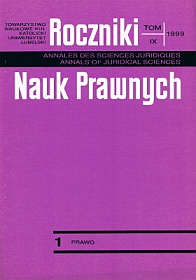The Polish Self-Government reform of 1998
Abstract
Regionalism was not well formed in Poland due to the loss of independence in 19th century and to preference for the principle of unity of the state in Poland between the world wars and during the communist period. In 1997 it was imposed by the authorities, which caused arguments about its territorial conception. It may be hoped that in a short time it will prove efficient and it will be accepted. Under the rule of Polish constitution of 2 April 1997 many forms of self-government are developed. Besides communal self-government established in 1990, from 1 January 1999 territorial self-government on the levels of district and province will work. These structures are not formed on the superiority principle, but they have their own autonomy of competence. The Polish region (province) does not occupy itself with administrative decisions. Its field of work is preparation of a strategy for regional development, preparation of co-operation programmes with foreign countries and forming regional policies. According to the Polish constitution territorial self-government is part of executive power. In practice, especially regions will surpass the position of executive. The new self-governmental region will support the forms of international co-operation shaped spontaneously in recent years, especially the so called “Euro-regions”, 24 of which were established along all Polish borders.
Copyright (c) 1999 Roczniki Nauk Prawnych

This work is licensed under a Creative Commons Attribution-NonCommercial-NoDerivatives 4.0 International License.


